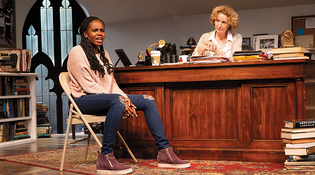 loading
loading
Arts & CultureLearning to listenA play about a knock-down drag-out fight between a professor and a student explores our current rut of "unsuccessful conversations." Michelle Chihara ’96 is an assistant professor with the Whittier College Department of English Language and Literature.  T. Charles EricksonLisa Banes takes on the role of Janine (right), a professor and historian, to Jordan Boatman’s Zoe (left), an activist, organizer, and student, in The Niceties, a play by Eleanor Burgess ’07 that offers plenty of political dialogue and no easy answers. The performance took place at the Geffen Playhouse in Los Angeles this past spring. View full imageIn our polarizing moment in American society, social media buffets us with never-ending waves of political conversation. At the same time, pundits say we are increasingly isolated, living in bubbles and echo chambers. Instead of bowling alone, we have come to a historical moment of angry networked typing, alone. Few of us give deep thought to the role that art can play in creating the kinds of spaces that make meaningful conversation possible. Playwright Eleanor Burgess ’07 is one such rare artist. Burgess’s current play, The Niceties, finishes its nationwide tour this fall in New York and New Jersey. It stages a political conversation. In many ways, The Niceties is actually a battle. Two women, a professor and a student, spar verbally for two acts. Janine is a historian of early America and a professor at a university much like Yale. She is white. Zoe is a young activist and an organizer who has written a history paper about the relationship between slavery and the American Revolution. She is black. While both of them would fall on the same side of the partisan aisle in America today, they are separated by gulfs in life experience and relationship to power. Ironically, it’s by staging a knock-down drag-out fight between these two women, who are having so much trouble hearing each other, that Burgess creates a space for audiences to really listen. “We’re stuck in a huge rut of unsuccessful conversations where people double down on what they already believe. These conversations are moving us further and further away from each other,” Burgess told me this summer. In the darkened room of a theater, physical immediacy brings people together. It doesn’t force them to agree, of course. But while audiences are captive, they are nonetheless interlocutors in a living and breathing dynamic. Audiences communicate with each production with their physical presence, their laughter, their gasps and concentrated attention. At the same time, they’re off the hook. Sitting together, they don’t have to immediately like, dislike, or swipe. They can reflect and take in context. They can react without fear of being called out. In the stage directions, Burgess writes that directors should “resist the temptation to think of only one of [the women] as a mouthpiece for the truth.” Both are in command of their arguments. Both of them have the facts of history at their disposal. It’s not a spoiler to say that the play is explosive without an easy resolution. By leaving open historical questions about early American society’s relationship to race, Burgess is able to bring audiences into meaningful contact with two human and powerful characters. Burgess was a history major at Yale, where she didn’t do much theater. She says she writes from an “obsessive” interest in the past, from a fascination with lives lived inside the sweep of historical change—with the degree to which our lives are shaped by the year in which we were born and by forces beyond our control. She is at work now on an action comedy for the screen, a new play set in the ’50s, and a play set just after the crucifixion of Jesus. By refusing to let anyone be entirely “right” or “wrong,” The Niceties doesn’t give easy ammunition for any partisan position. Thus, it demands further processing. Judging from the play’s reception, people are talking. When it was staged at the Geffen Playhouse in L.A., the Los Angeles Times opined that “No contemporary play better captures America’s cultural divides.” As Sherry Turkle writes in Reclaiming Conversation: “Fully present to one another, we learn to listen.”
The comment period has expired.
|
|